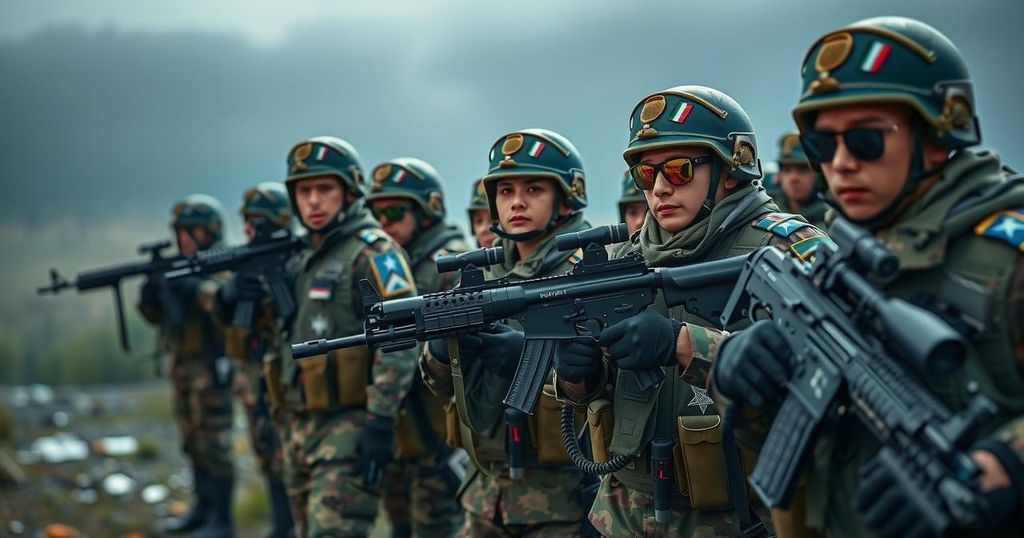Examining the Role of North Korean Troops in the Ukraine Conflict

North Korean troops, initially rumored to serve non-combat roles in Ukraine, are now reportedly engaged in combat supporting Russian forces. Estimates of troop numbers vary significantly, with assumptions regarding their combat effectiveness being challenged. North Korea’s motivations relate to financial gain and access to technology, raising security concerns for South Korea amidst escalating tensions in the region.
Recent discussions regarding North Korean troops in Ukraine have raised significant questions about their involvement and effectiveness in support of Russia’s military operations. Initial reports suggested these forces would be limited to non-combat roles due to their lack of battlefield experience. However, recent intelligence indicates that they have already engaged Ukrainian forces in combat, prompting a reassessment of their deployment and capabilities. The initial estimates put forth by the Pentagon indicated that approximately 11,000 troops would be sent by Pyongyang; however, some sources suggest actual numbers could reach as high as 100,000. Nevertheless, verification of these figures is challenging, given that neither Moscow nor Pyongyang have publicly addressed these claims. The readiness and effectiveness of these troops remain in question. While North Korea boasts one of the largest militaries globally, the Korean People’s Army lacks recent combat experience. Experts such as Mark Cancian from the Centre for Strategic and International Studies noted that while North Korean soldiers are indoctrinated, their readiness is low. Some analysts argue, however, that this characterization underestimates the potential skills of certain elite units like the 11th Corps, which is trained in special operations. Intelligence reports suggest that these troops may possess unique capabilities, especially in terms of physical and psychological endurance. Michael Madden from the Stimson Center points out that these soldiers are adept at maintaining composure under severe stress, compensating for their lack of combat experience with resilience. Furthermore, observable training activities in Russia have hinted that they are receiving additional preparation tailored to the current context of the conflict in Ukraine. The reasoning behind North Korea’s involvement is multifaceted. North Korea seeks financial benefit from this arrangement, potentially earning around $2,000 per soldier per month. Alongside monetary gain, Pyongyang could gain access to advanced Russian military technology, which has been limited historically. The collaboration is mutually beneficial, addressing Russia’s manpower shortage amid substantial casualties while simultaneously bolstering North Korea’s military capabilities. The situation poses significant concern for South Korea, particularly amidst heightened tensions on the Korean Peninsula. Historical grievances, alongside recent aggressive posturing from the North, including drastic actions against South Korean interests, have made Seoul wary of Pyongyang acquiring any military advantages. This evolving conflict forward complicates the dynamics in East Asia, amplifying existing fears of regional instability. In conclusion, the deployment of North Korean troops to support Russia in Ukraine reveals a complex interplay of military strategy, political maneuvering, and regional implications. The depth of their involvement and the skills they bring to the battlefield remain uncertain, yet the repercussions of this alliance resonate throughout the geopolitical landscape of East Asia.
The involvement of North Korean troops in the Russian-Ukrainian conflict has garnered attention due to the implications it holds for regional stability and military balance. The Korean People’s Army, while large in number, is characterized by limited recent combat experience, raising questions about the effectiveness of its troops. The context of North Korea’s motivations for engagement reflects broader strategic interests related to financial gain and access to military technology. South Korea’s concerns about this development are amplified by existing tensions on the Korean Peninsula, where the dynamics have historically been fraught with rivalry and military caution.
North Korean troops have begun to engage in combat alongside Russian forces in Ukraine, challenging prior assumptions about their capabilities and roles. Their potential effectiveness, while questioned due to a lack of recent experience, is bolstered by intelligence that indicates their deployment consists of elite units and that they are receiving additional training under Russian command. For South Korea, these developments raise significant security concerns, prompting both regional scrutiny and potential shifts in defense policy.
Original Source: www.bbc.com








